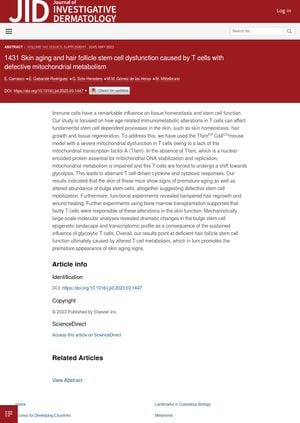Skin Aging and Hair Follicle Stem Cell Dysfunction Caused by T Cells With Defective Mitochondrial Metabolism
April 2023
in “
Journal of Investigative Dermatology
”

TLDR Defective T cell metabolism can cause early skin aging and poor hair follicle stem cell function.
The study "1431 Skin aging and hair follicle stem cell dysfunction caused by T cells with defective mitochondrial metabolism" investigates how age-related changes in T cells can impact skin homeostasis, hair growth, and tissue regeneration. The researchers used a mouse model with severe mitochondrial dysfunction in T cells due to a lack of the mitochondrial transcription factor A (Tfam). The absence of Tfam forces T cells to shift towards glycolysis, leading to abnormal T cell-driven responses. The skin of these mice showed signs of premature aging and altered abundance of bulge stem cells, suggesting defective stem cell mobilization. The study also found hampered hair regrowth and wound healing. Further experiments using bone marrow transplantation confirmed that faulty T cells were responsible for these skin function alterations. Large-scale molecular analyses revealed significant changes in the bulge stem cell epigenetic landscape and transcriptomic profile due to the sustained influence of glycolytic T cells. The study concludes that altered T cell metabolism can lead to deficient hair follicle stem cell function, promoting the premature appearance of skin aging signs.


